Most people usually think of emotion as a subjective feeling of a certain kind, the kind for which labels like happy, sad, and frightened are appropriate. However, there is much evidence to suggest that this is too narrow a way to define emotions, and that a different and broader conceptualization is needed. If we examine the history of theories of emotion we find a great diversity of views. For example, Darwin, in his 1872 book ‘The Expression of the Emotions in Man and Animals’, conceived of emotions as expressive behaviors that had the function of communicating intentions from one animal to another in the presence of conflicts or emergencies. Emotional expressions, from this point of view, regulated interpersonal relations and increased the chances of individual survival.


